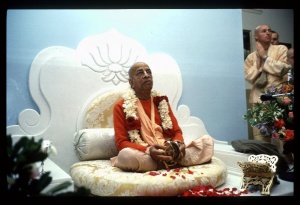SB 3.14.49

A.C. Bhaktivedanta Swami Prabhupada
TEXT 49
- alampaṭaḥ śīla-dharo guṇākaro
- hṛṣṭaḥ pararddhyā vyathito duḥkhiteṣu
- abhūta-śatrur jagataḥ śoka-hartā
- naidāghikaṁ tāpam ivoḍurājaḥ
SYNONYMS
alampaṭaḥ — virtuous; śīla-dharaḥ — qualified; guṇa-ākaraḥ — reservoir of all good qualities; hṛṣṭaḥ — jolly; para-ṛddhyā — by others' happiness; vyathitaḥ — distressed; duḥkhiteṣu — in others' unhappiness; abhūta-śatruḥ — without enemies; jagataḥ — of all the universe; śoka-hartā — destroyer of lamentation; naidāghikam — due to the summer sun; tāpam — distress; iva — likened; uḍu-rājaḥ — the moon.
TRANSLATION
He will be a virtuously qualified reservoir of all good qualities; he will be jolly and happy in others' happiness, distressed in others' distress, and will have no enemies. He will be a destroyer of the lamentation of all the universes, like the pleasant moon after the summer sun.
PURPORT
Prahlāda Mahārāja, the exemplary devotee of the Lord, had all the good qualities humanly possible. Although he was the emperor of this world, he was not profligate. Beginning from his childhood he was the reservoir of all good qualities. Without enumerating those qualities, it is said here summarily that he was endowed with all good qualities. That is the sign of a pure devotee. The most important characteristic of a pure devotee is that he is not lampaṭa, or licentious, and another quality is that he is always eager to mitigate the miseries of suffering humanity. The most obnoxious misery of a living entity is his forgetfulness of Kṛṣṇa. A pure devotee, therefore, always tries to evoke everyone's Kṛṣṇa consciousness. This is the panacea for all miseries.